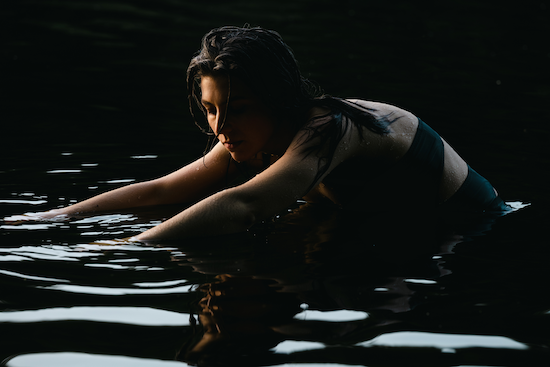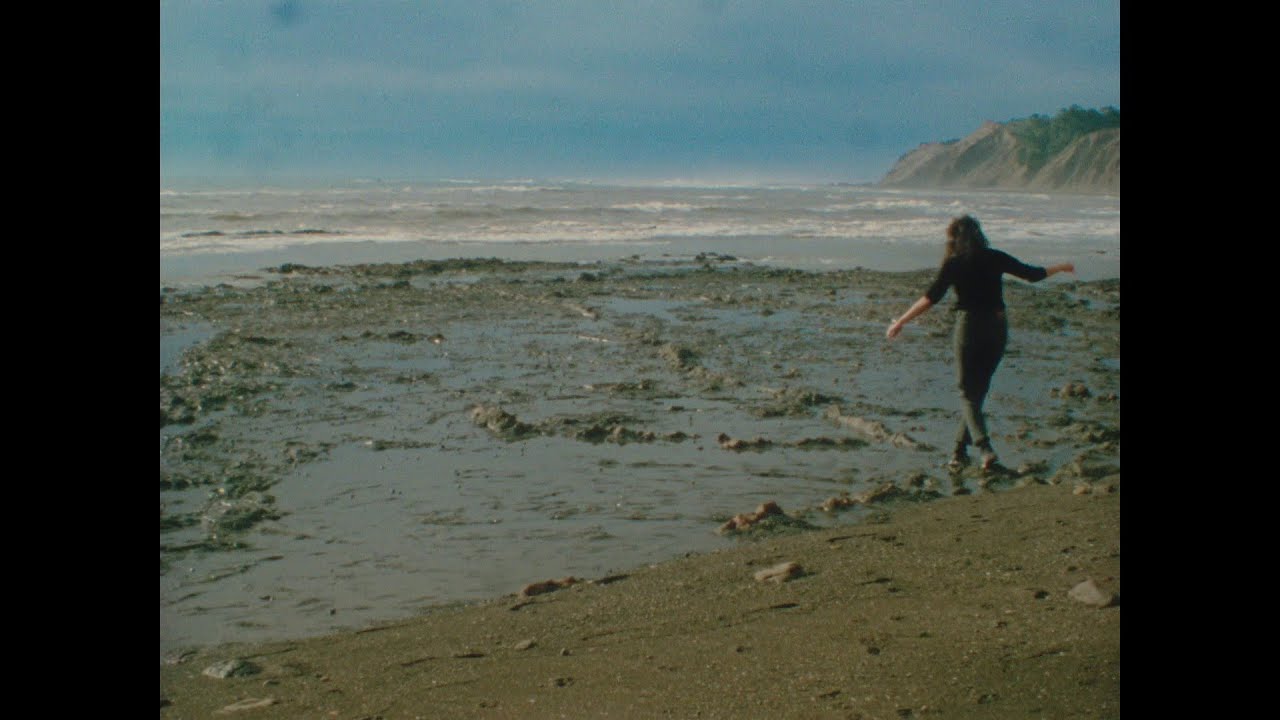Julia Holter is back in L.A. after a trip to Belgium for a handful of performances with her partner Tashi Wada. Just a day after returning, she taught her ‘Introduction To Songwriting’ class at Occidental College. In short, she’s been busy, occasionally stifling a yawn on our call. “Running a class is a little challenging,” she says. “It’s very different from performing. The students all make really cool work, and I learn a lot from them, and I love sharing music that they maybe haven’t heard before.” It’s not her first time teaching, having been brought on as a visiting assistant professor in 2021. She’s also taught workshops for the French organisation CAMP, which included prompts that she uses herself when writing.
“I agree with people when they say you teach things that you’re learning about yourself,” she says. “The CAMP workshop specifically was called ‘words and non-words in music’ and it was exploring the role of sound in words and music. It was also about getting your creativity moving and using games and different methods to get lyrics out. That’s a big thing for me that’s a struggle, as a person that comes up with the sound first, so I try to make it fun for myself. I’m always coming up with ways to make it work, and focusing on the sound of words, what role they play and what meaning emerges from songs perceived by the listener.
Are they getting the actual meaning of the words? Or is it something a little more complex? I think it’s the latter. My parents are historians, and they listen to music for the lyrics. When I play them songs, they’re like, ‘I can’t hear what you’re singing!’”
After her last record, 2018’s rapturous Aviary, Holter embarked on a busy tour with her band. She had planned to write new music in 2020, amidst other hefty undertakings such as scoring work for the films Never Rarely Sometimes Always and Karen Dalton: In My Own Time, but life got in the way of creative pursuit. “I got pregnant, and then also Covid started. It was a completely new situation. As for most people during this time, we were experiencing a lot of shifts. It was very hard for me to write.”
In the past she would look to literature for inspiration, but that didn’t work. “I couldn’t read for some reason. I don’t know if that’s hormonal for me,” she wonders. “I’m not an avid, intense reader. I don’t read five books a month like some friends of mine, but I do rely on books as inspiration. It’s a quiet place for your imagination to go wild when you’re reading, and I just think it’s healthy for our brains.” This inertia was compounded by exhaustion. “I didn’t have a lot of energy. I had to push through it. In the earliest demo of ‘Evening Mood’ I was yawning because I was literally falling asleep while recording… I was so narcoleptic. It was a weird time… so the record had a slow start.”
You wouldn’t know it listening to Something In The Room She Moves, a record that’s teeming with ideas, full of lavish instrumentation, formal experimentation, and wide-open soundscapes inspired by her daughter’s favourite film, the Studio Ghibli production Ponyo. There are direct declarations of love, as well as surreal and mysterious asides. Songs blossom unexpectedly. There’s a communal feel, given her employment of close friends as collaborators; even the artwork was made by a childhood friend, artist Christina Quarles.
As she sought ways to navigate this hectic period, Holter focussed on her immediate surroundings. “It’s good for me to have to be in the present because I linger on the past and what’s going to happen in the future a lot,” she says. “That’s why this record feels this way – focusing on the material, the feeling of someone’s hand in mine. Love in the present, love that is real; it’s not going to happen in the future and it’s not reflected from the past.” It also encourages presence in the listener, rewarding mindful engagement. When consumed as such, delicate woodwind solos which colour the record turn from a pretty detail to a moving centre, like the music is revealing its magic right there in front of you.
Being present is something Holter has had to work on, however. “It doesn’t come easily to me, and probably not to most people [when they’re being] constantly interrupted, which is what happens when you become a parent. And it’s not just being a parent. Say you’re an artist and you also have a job that’s demanding; there are many ways that people can relate to this besides having a child. But while it’s an obstacle to getting work done to have interruptions all the time, it’s also healthy for me in some ways.”

Other interruptions included delays due to band members falling ill with coronavirus, or Holter herself being unable to sing. Other stalls came from Holter having a specific vision she wanted to nail, such as the single ‘Sun Girl’. The song is a high-definition reimagining of her early ambient pop, with expressive flute, fretless bass and toybox percussion collaged around simple nursery rhyme melodies. “I was really obsessed with capturing this feeling of playfulness, but I didn’t know how to explain it,” Holter says. “I had so many versions. There were times when I almost gave up on it, not to be dramatic. I had this on Aviary, too, where I’d have this specific vision I wanted to make real. In that case, it was the song ‘Chaitius’.” She and her band eventually figured it out through a jam session. “I had a loose template and I didn’t give a lot of direction. We were just jamming on C major, so it was really vague, but I just wanted to get people making sounds, then I wanted to mess with it at home. So it was really like a collage piece, whereas most songs we came into the studio with specific charts. ‘Sun Girl’ was the outlier.”
Another key moment of spontaneity came with the naming of the album, subconsciously inspired by a lyric on The Beatles’ ‘Something’, one of many artists whose songs she sang to her child at bedtime. “I only knew the words to songs that I was deep into the discography of as a teenager, that’s a period in which I would learn all the lyrics. Before I wrote music, I was imitating a lot. I would sit and learn how to play a Tori Amos song, or a Fiona Apple song, or a Beatles or Radiohead song. I had to choose from those, and the Beatles was one of them,” she says. “I put together the title in a split-second. I was just naming a project file, and I came up with that for some reason. That was while I was pregnant, though. I wasn’t thinking about the Beatles at that point. It’s a weird coincidence.”
The Beatles would crop up again later, too, with the release of Peter Jackson’s Get Back documentary and its exhaustive focus on the creative process. “The attraction of that documentary was strong because it was completely different to what was going on [for artists during the pandemic]. It was about these four famous iconic people making music in this high-production way. Everyone cared about it. It was so different from the current time.”
Discussion turns to how things have changed since Holter first started releasing music in the early 2010s. Through her work with United Musicians and Allied Workers, she’s spoken out before about the shortcomings of a streaming model. “It’s this devaluation of music that’s come about from the rise of Spotify and their free tier. These things are not good if we want to have music that’s made with heart and soul. We can’t make the statements like they do at Spotify that ‘you’d better make music more than once every three years.’ That mentality is very toxic for creative people. Also, who wants to listen to 500 records by one artist in the course of three years? That’s too much content. Nobody needs all that content.”
Having waited almost six years since her last album Aviary, however, Holter’s fans have been understandably excited to hear more. That pressure to constantly share has made her reflect on how the attention economy works. “I’ve really started to respect the journalists who are documenting what artists are doing,” she says. “There’s so much reliance on social media for artists to express themselves, but maybe some don’t want to express themselves on social media all the time. Maybe they’d rather talk to a professional journalist who could parse through it for them. It can be more interesting that way. You’re supposed to always be talking to the fans. Like, come on! That kind of entrepreneurial thing, it might be generational, maybe I’m just not into it. I think it’s nice to have some mystery.”

It’s easy to slip into academic language about what, on Something In The Room She Moves is largely feeling-based music, yet it’s playfulness that’s most central to Holter’s process. On ‘Spinning’, she captures the feeling of a song forming in front of you (“What is the circular magic I’m visiting?”). She has consistently evoked wonder through her work, and this is no different. “I feel the same as when I started making music. My approach is consistently quite childlike and primitive. That’s why it’s hard to be a teacher sometimes, because I’m not pristine in my approaches. If they see me try to put together a beat, it’s so embarrassing because I’m a total mess. I love trial and error. I love mistakes. For me. That’s what’s so fun about music.”
It’s a struggle to maintain our curiosity as we grow older and encounter the world’s shortcomings. Art is one way to hold onto it, but even then, it’s easy to retreat into the past than it is to keep searching for newness. So many of us are hitting replay on music we already know by the time we’re 30. It’s comforting, perhaps, and yet there’s still so much to inspire us in the present. Through her teaching, her artistry, and the connections it affords, for Holter newness is all around. “It’s a pretty conservative climate for music. But in other ways, there’s so much weird music being made because people have so much access to music. Young people are experimenting. That’s great. We just need to be able to support it all.”
Julia Holter performs at Rewire Festival in The Hague, Netherlands, which takes place from 4-7 April. For tickets, the full lineup and more information click here.
Something In The Room She Moves is released via Domino on 22 March



